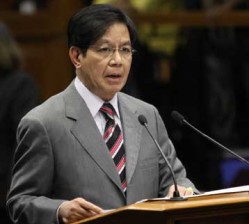Sen. Panfilo “Ping” Lacson wants to know if the proposed Bangsamoro will have its own police force and whether this will be considered a part of the country’s armed forces.
The chairman of the Senate committee on national defense and security also wonders if the framework agreement to be signed today in Malacañang between the Aquino administration and the Moro Islamic Liberation Front (MILF) will be an assurance that no new rebel group will emerge later in Mindanao to challenge its authority.
Lacson also hopes that the term Bangsamoro, which roughly translates to “Nation of Muslims,” will not lead to dismemberment of the republic.
The former director general of the Philippine National Police said the issue of whether Bangsamoro would have its own police force could involve the Constitution.
Lacson said in a radio interview that the Constitution designated the President the Commander in Chief of all armed forces in the country.
“Although I’m not a lawyer, the term ‘all armed forces’ [would include] the police since they are also armed forces,” he added.
Lacson said he could not find a specific provision in the framework agreement indicating the PNP’s involvement in peacekeeping efforts and security in the proposed autonomous region.
Article VIII, Section 3, of the framework agreement on “Normalization” says:
“As a matter of principle, it is essential that policing structure and arrangement are such that police service is professional and free from partisan political control. The police system shall be civilian in character so that it is effective and efficient in law enforcement, fair and impartial as well as accountable under the law for its action, and responsible both to the Central Government and the Bangsamoro Government and to the communities it serves.”
A matter of concern
“There is only one armed forces, there is really no problem there,” Lacson said.
But on the police force, there seems to be a problem, he said, because the new entity is called upon to set up its own PNP. He said the National Police Commission had no mandate to set this up.
He said this was worrying him as chairman of the Senate committee on security.
Lacson said he hoped that the transition team tasked with overseeing the smooth conversion from the Autonomous Region in Muslim Mindanao (ARMM) to Bangasamoro would clearly define this policy on the police force tasked with keeping the peace in the region.
He acknowledged that more talks would be held, pointing out that details have not been hammered out although principles and guidelines have been spelled out in the framework agreement.
On the possibility of new rebel groups coming up, he noted that the MILF was an offspring of the Moro National Liberation Front.
“And now we even have the Bangsamoro Liberation Organization. We are not sure how many its forces are. These things should be addressed,” he said.
What’s in a name
“It may be petty but what does Bangsamoro mean? The term ‘Moro’ was introduced by the Spaniards who used it in 1570 to refer to our Muslim brothers. The Spaniards were fighting the Moors then so they called [the Muslim natives] Moro,” the senator pointed out.
According to Lacson, Bangsa’s Filipino root word is “bansa” for country or nation.
“So, if you say nation of Moro because it’s Bangsamoro, is it [a reference to a] separate nation? It may be petty. ‘What’s in a name,’ some would say but there is a connotation. Why do they refer to it as Bangsamoro? It refers to people and nation,” he said.
Still, Lacson said the issue may be a little problem for the rest of the country but acknowledged that it could be a “major concern for members of the MILF.”
Senate President Juan Ponce Enrile said Congress would scrutinize the implementing law that would eventually comprise the Bangsamoro basic law.
Senators Aquilino Pimentel III and Loren Legarda, on the other hand, have both urged Filipinos to “give peace a chance” and the framework agreement an opportunity to work itself out.
Revenue allotment
In Legazpi City, San Juan Rep. Joseph Victor Ejercito and former Sen. Ernesto Maceda expressed disagreement on a provision in the Bangsamoro agreement that would grant the autonomous region a 75-percent share of the national Internal Revenue Allotment (IRA).
In a press conference on Friday, Ejercito said that providing a bigger share to the ARMM would cause a disparity in the distribution of IRA among the 16 regions in the country.
Under existing laws, local government units only get a 40-percent as IRA share from the national government and thus giving the ARMM more than what the law provides would violate the Local Government Code, Maceda stressed.
Ejercito and Maceda, who are both seeking Senate seats in next year’s midyear elections, said the code would have to be reviewed and amended if the Aquino administration would insist on a bigger IRA share for Bangsamoro regions. With a report from Mar Arguelles, Inquirer Southern Luzon
Originally posted: 9:04 pm | Sunday, October 14th, 2012
